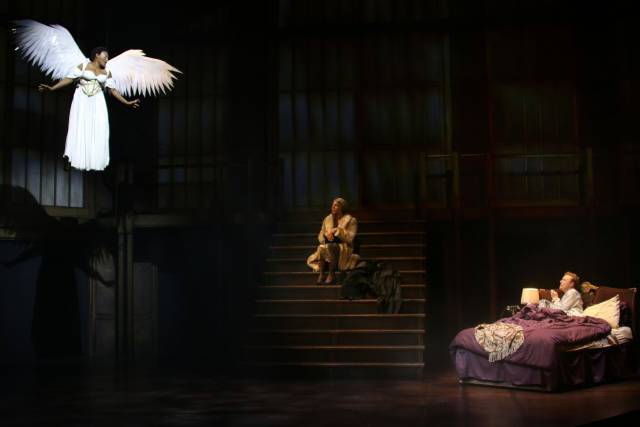

Tony Kushner’s epic Angels in America remains a landmark of contemporary theatre, and how could it not? It tackled the AIDS crisis, the end of the Cold War, and millennium anxiety, without losing sight of the humanity of the characters at its center. It’s a show that to day feels very much like a cathedral: it’s ornate enough to make us feel overwhelmed, but welcoming enough to make us feel like we belong. The production at Round House Theatre in Bethesda, Maryland (a co-production with Olney Theatre Center) focuses mainly on the deep connections between the characters, and how they relate to us. To call it a mirror would be too easy, more than anything sitting in that theater for six hours and 40 minutes (if you choose to take in Millennium Approaches and Perestroika in a single dose) feels more like group therapy.
One could argue that the need to establish community is one of the central forces in the play. After all, we see how lonely wife Harper (Kimberly Gilbert) has to dream up companions that will help her as her husband Joe (Thomas Keegan) drifts away. Or how part of what makes Joe seek comfort in the arms of Louis (Jonathan Bock) is the very need to find other people like him. Or that one of the excuses Louis gives himself to abandon his partner Prior (Tom Story) when he needs him the most, is that Prior will be alright because he has friends like Belize (Jon Hudson Odom). Reaching out to others, whether imaginary or real, helps each of the characters achieve a sense of purpose, proof of the divinity that they all desperately crave.
If there is an element within the play that this production highlights the most, is the seduction speech Louis gives to Joe in which he explains the nature of smells as being “some part of you, where you meet the air, is airborne” and how these molecules that once belonged to someone are now being inhaled by another. In a play in which scene transitions occur at an almost cinematic pace, directors Jason Loewith (Millennium Approaches) and Ryan Rilette (Perestroika) often leave characters behind slightly longer than they should, a touching reminder of how even the characters who never meet, Harper and Belize for example, are still united by something molecular or spiritual. Similarly, there is a rectangular trap door stage center that remains open longer than it should, inviting the characters and the audience to contemplate mortality.
For all we know Kushner himself might be a prophet sent to Earth to prepare us for the horrors that await us after the 2016 presidential election, traces of which can be found in how he wrote Roy Cohn (Mitchell Hébert) as the rotten tree from which Donald J. Trump would fall, which is also why the experience of the show also tends to feel as comforting as a sermon. But by making the Cohn-Trump connection even more disturbing and timely, we can’t help but see how behind its seemingly fatalistic facade, Kushner wrote a play brimming with hope. If Reagan, AIDS and the Cold War couldn’t destroy humanity, why then would we assume the great work mentioned in the play is finished? By the time the plays reach their conclusion in the fountain of Bethesda, we too feel like we have been washed anew.